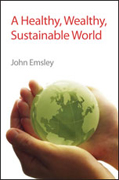
Healthy, wealthy, sustainable world
Emsley, John
Saltmarsh, Mike
Coultate, Tom
Garner, C.Dave
This book explains to the general reader the roles of chemistry in various areas of life ranging from the entirely personal to the worryingly global. Theseroles are currently not widely appreciated and certainly not well understood.The book is aimed at educated laypeople who want to know more about the worldaround them but have little chemical knowledge. The themes relate to the importance of chemistry in everyday life, the benefits they currently bring, and how their use can continue on a sustainable basis. INDICE: Introduction; Health and Chemistry; Food and Chemistry; Water and Chemistry; Transport, Biofuels and Chemistry; Plastics and Chemistry; Cities and Chemistry; Sport and Chemistry; Glossary; Something to think about; Sourcesand further reading; Index Topics include: o food chemistry - with particularemphasis on calories and additives o water - the seas as a resource for drinking water and raw materials o the motor car - making them more efficient, safer, and longer lasting o biofuels - what are they and from what source will they come? o nanotechnology - what this can offer now and in the future o well-being - conquering the diseases and stresses which still threaten us o uncommon metals - some little known yet important metals The number seven has a specialresonance in human affairs, as is demonstrated by the seven deadly sins, seven wonders of the world, seven seas, seven days of the week and lucky seven. Toreflect this, the contents are arranged in seven chapters and, within every chapter, there are seven sub-themes. Each chapter ends with seven simple piecesof advice. The final chapter tackles the issue of communicating knowledge about 'chemicals' to a wider public. The word chemicals is placed in inverted commas because it is now widely misused to mean something which is assumed to be harmful or polluting. The author argues that, just as there is a placebo effect in which as many as a third of people in double-blind tests appear to benefit from a non-active agent, there is an anti-placebo effect in which a large number of people appear to be adversely affected by what they perceive to be a dangerous substance when in fact it may even be beneficial.
- ISBN: 978-1-84755-862-6
- Editorial: Royal Society of Chemistry
- Encuadernacion: Cartoné
- Páginas: 170
- Fecha Publicación: 01/06/2010
- Nº Volúmenes: 1
- Idioma: Inglés
